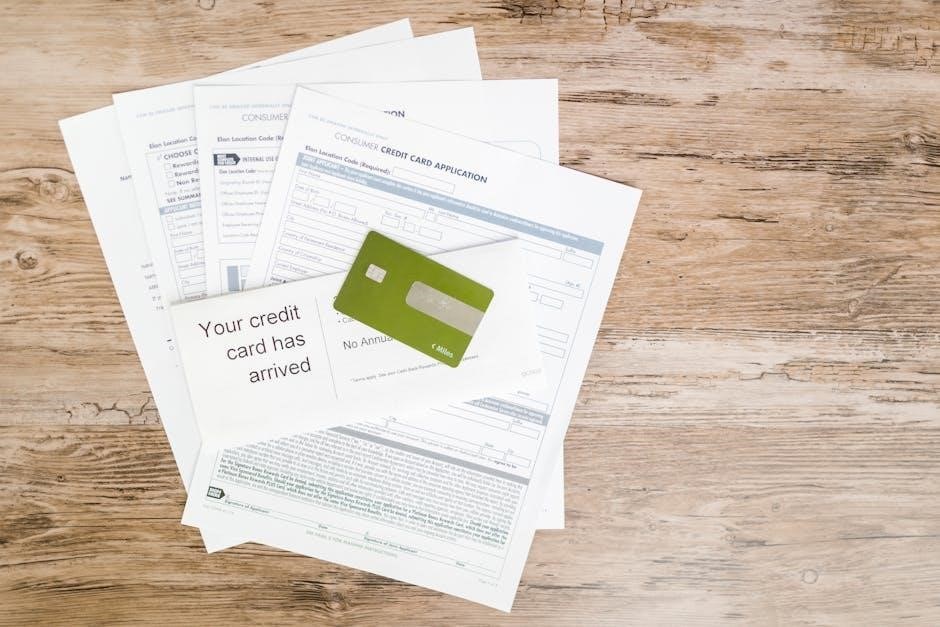Organizing the 25 essential documents before you die is crucial for ensuring your wishes are honored and your loved ones avoid unnecessary stress. This guide, inspired by the Wall Street Journal’s groundbreaking article, outlines the key documents you need to prepare, from estate planning to digital assets, ensuring everything is in order for your heirs. Proper organization prevents financial burdens and emotional strain, making it a vital step in responsible planning.
Importance of Having Essential Documents
Having the 25 essential documents ensures your wishes are respected, reduces stress for loved ones, and prevents legal complications. Proper documentation guarantees clarity in financial, healthcare, and personal decisions, avoiding costly disputes. It provides peace of mind, knowing your affairs are in order, and safeguards your legacy for future generations. Organization is key to preventing frustration and financial burdens after your passing.
Overview of the 25 Documents You Need Before You Die
The 25 essential documents cover estate planning, financial affairs, healthcare decisions, and personal details. They include wills, trusts, powers of attorney, advance directives, insurance policies, and more. These documents ensure your wishes are clear, assets are protected, and loved ones are guided seamlessly through legal and emotional challenges. Organizing them now prevents future complications and financial strain, offering peace of mind for you and your family.

Estate Planning Documents
Estate planning documents, like wills, trusts, and powers of attorney, ensure your assets are distributed according to your wishes and protect your legacy. These documents guide your heirs and prevent legal complications, offering clarity and peace of mind for the future. They are foundational for a comprehensive estate plan, safeguarding your family’s well-being.
Last Will and Testament
A Last Will and Testament is a foundational estate planning document that outlines how your assets will be distributed after your death. It allows you to designate heirs, name an executor, and specify funeral instructions. Without a will, state laws determine asset distribution, which may not align with your wishes. Having a legally binding will ensures your legacy is protected and your family avoids costly legal disputes.
Living Trust
A Living Trust is a legal document that allows you to transfer assets into a trust during your lifetime, bypassing probate upon your death. It ensures privacy and control over asset distribution, with you as the grantor maintaining management rights. A Living Trust is revocable, enabling updates as your circumstances change, and is essential for avoiding costly probate processes while protecting your estate’s integrity.
Power of Attorney (POA)
A Power of Attorney (POA) grants a designated individual authority to manage your financial, legal, and personal affairs if you become incapacitated. It ensures continuity in decision-making without court intervention. A durable POA remains in effect even after incapacitation, while a springing POA activates only under specific conditions. Having a POA in place is crucial for protecting your interests and providing peace of mind.
Letter of Instruction
A Letter of Instruction complements your will by providing personal guidance for your heirs. It outlines preferences for funeral arrangements, asset distribution, and other wishes not covered in legal documents. This letter offers clarity and reassurance, ensuring your loved ones understand your intentions beyond formal estate plans. It’s a heartfelt way to share your legacy and ease their decision-making process during a difficult time.

Financial Documents
Having organized financial documents ensures your heirs manage assets seamlessly. Key documents include bank account details, investment statements, retirement records, and life insurance policies, preventing financial complications after your passing.
Bank Account Information
Organizing bank account information is essential for straightforward estate management. Include account numbers, bank names, balances, and types of accounts (checking, savings, etc.). Ensure your heirs can access funds without delays. List joint account holders and beneficiaries to prevent disputes. Keeping this information updated ensures financial continuity and avoids unnecessary complications for your loved ones after your passing.
Investment Account Statements
Keeping investment account statements up to date is vital for managing and distributing assets. Include account numbers, balances, and investment types. Ensure statements are easily accessible and clearly indicate beneficiaries. This documentation helps heirs understand your financial holdings and makes the process of managing or transferring investments smoother after your passing.
Retirement Account Documents
Retirement account documents, such as 401(k)s, IRAs, and pension plans, are crucial for ensuring your assets are distributed according to your wishes. Include beneficiary designations, recent statements, and any governing agreements. These documents provide clarity on how retirement funds should be managed and disbursed, offering peace of mind for your heirs by avoiding potential disputes or confusion.
Life Insurance Policies
Your life insurance policies are vital for ensuring financial protection for your loved ones. Include policy numbers, beneficiary designations, and recent statements. These documents provide clarity on coverage and payouts, ensuring your heirs receive the benefits you intended without unnecessary delays or complications. Keeping them updated guarantees your wishes are respected and financial security is maintained.

Healthcare-Related Documents
These documents ensure your medical wishes are honored and protect your family from difficult decisions. They include advance directives, living wills, and healthcare power of attorney, safeguarding your preferences and preventing conflicts.
Advance Directive
An advance directive outlines your preferences for medical treatment if you become incapacitated. It includes a living will and healthcare proxy, ensuring your wishes are respected and reducing the burden on loved ones. This document prevents conflicts and guarantees your autonomy in end-of-life care, aligning with your values and ensuring dignity in critical situations.
Living Will
A living will is a legal document specifying the medical treatments you do or do not want if you become terminally ill or incapacitated. It ensures your wishes are honored when you cannot communicate, addressing life-sustaining treatments and end-of-life care. This document guides healthcare providers and alleviates the burden on family members, guaranteeing your autonomy and preferences are respected during critical moments.
Do-Not-Resuscitate (DNR) Order
A Do-Not-Resuscitate (DNR) Order is a legal document instructing healthcare providers not to perform CPR if your heart stops or you stop breathing. It ensures your wishes regarding end-of-life medical interventions are respected. Signed by both you and your doctor, it is a crucial component of advance care planning, allowing you to maintain control over your medical treatment during critical moments. Discussing this with loved ones is essential for clarity and alignment.
Healthcare Power of Attorney
A Healthcare Power of Attorney (HCPA) appoints a trusted individual to make medical decisions on your behalf if you become incapacitated. This document ensures your healthcare wishes are carried out according to your preferences. It is essential for maintaining autonomy and avoiding family disputes over medical care. Discuss your desires with your agent to guarantee clarity and alignment with your values.

Personal and Family Documents
Personal and family documents are vital for verifying identity, inheritance, and family history. Essential documents include marriage licenses, divorce papers, birth certificates, and family medical history records. These ensure clarity and legal validation of personal and familial relationships, aiding in inheritance and genealogical matters.
Marriage License
A marriage license is a critical document that legally verifies your marriage. It includes details such as the date, location, and names of both spouses. This document is essential for inheritance rights, legal benefits, and name changes. Keeping a certified copy ensures your marriage is officially recognized, aiding in various legal and administrative processes throughout your life.
Divorce Papers
Divorce papers are essential for clarifying legal separations and property divisions. These documents outline the terms of the divorce, including asset distribution and custody arrangements. Keeping copies ensures legal rights are protected and avoids future disputes. They are vital for estate planning, as they clarify ownership and inheritance matters, preventing potential conflicts among heirs.
Birth Certificates
Birth certificates are foundational documents verifying identity and lineage. They are crucial for inheritance claims and legal processes, ensuring heirs can prove their right to assets. Keeping originals and certified copies ensures smooth estate execution and avoids delays in beneficiary claims. These records are indispensable for verifying family ties and securing legal entitlements, making them a cornerstone of personal documentation.
Family Medical History
A detailed family medical history is vital for understanding genetic health risks and informing future medical decisions. Documenting illnesses, allergies, and hereditary conditions within your family provides essential insights for healthcare providers. This record ensures that your heirs can make informed choices about their health and prepares them for potential genetic predispositions, safeguarding their well-being and aiding in preventive care planning for generations.

Tax-Related Documents
Tax-related documents ensure compliance with legal requirements and prevent financial complications for your estate. Key records include tax returns, estate tax planning, and gift tax documents.
Tax Returns
Keeping accurate and up-to-date tax returns is essential for estate planning and financial protection. These records help prevent disputes and ensure compliance with legal requirements. Organize federal, state, and local returns, updating them regularly to reflect income changes. Proper documentation safeguards your heirs from unnecessary burdens, ensuring a smooth transition of assets and minimizing potential tax-related complications.
Estate Tax Planning
Estate tax planning is crucial to minimize taxes and ensure your assets transfer smoothly. Key strategies include gifting, trusts, and leveraging exemptions. Proper planning reduces tax burdens on heirs, allowing them to retain more of your estate. Regularly review and update your plan to adapt to tax law changes and personal financial shifts, ensuring long-term protection and peace of mind.
Gift Tax Documents
Gift tax documents are essential for tracking transfers made during your lifetime to minimize estate taxes. They include records of gifts, appraisals, and IRS filings. Keeping detailed records ensures compliance with tax laws and prevents audits. Proper documentation also helps maximize tax exemptions, such as the annual gift tax exclusion, allowing you to transfer wealth strategically while reducing your taxable estate.

Property and Asset Documents
Securely organize property deeds, vehicle titles, stock certificates, and savings bonds to prove ownership and facilitate smooth asset transfers. These documents prevent disputes and ensure clarity in estate distribution, safeguarding your legacy for future generations.
Property Deeds
Property deeds are essential documents proving ownership of real estate. They include property descriptions, ownership details, and legal transfer records. Keeping them organized ensures clear title transfer and prevents disputes. Store originals securely, such as in a safe or with an attorney, to safeguard your legacy and facilitate smooth inheritance processes for your heirs.
Vehicle Titles
Vehicle titles are crucial documents proving ownership of automobiles, motorcycles, or other vehicles. They detail the vehicle’s make, model, and VIN, ensuring legal transfer of ownership. Keeping titles organized prevents disputes and simplifies inheritance. Store originals securely, such as in a safe or with an attorney, to ensure heirs can manage and transfer ownership without complications or legal delays.
Stock Certificates
Stock certificates are legal documents proving ownership of shares in companies. They detail the number of shares, owner’s name, and company information, ensuring clear ownership transfer. Organizing these certificates is vital for inheritance, as they simplify asset distribution and prevent disputes. Keep them secure, such as in a safe or with an attorney, to ensure heirs can manage and transfer shares efficiently without legal complications.
Savings Bonds
Savings bonds are essential documents that serve as proof of ownership in government-backed investments. They are low-risk and typically used for long-term savings. Proper documentation of savings bonds ensures that heirs are aware of these assets, preventing potential loss or oversight. Keeping records of bond serial numbers, issue dates, and current values is crucial for seamless inheritance. Securely store these documents to avoid financial complications for your loved ones.

Digital Assets and Accounts
Digital assets and accounts require careful planning to ensure secure access for heirs. Include password management systems, online account information, and digital estate instructions to avoid loss or complications.
Digital Estate Planning
Digital estate planning ensures your online presence and assets are managed according to your wishes. Include password management systems, online account information, and instructions for heirs to access digital assets. This prevents financial loss and emotional distress, ensuring your digital legacy is handled responsibly and securely.
Password Management
Securely managing passwords is essential for protecting digital assets. Use a reputable password manager to store login credentials for bank accounts, email, and social media. Share access with trusted individuals or include instructions for heirs to ensure they can access critical accounts without unnecessary complications or financial setbacks.
Online Account Information
Keeping a detailed list of online accounts, including usernames, passwords, and security questions, simplifies access for heirs. This includes social media, email, banking, and subscription services. Organizing this information ensures your loved ones can manage digital assets without legal or technical hindrances, providing peace of mind and efficient resolution of digital affairs after your passing.

Funeral and Memorial Planning
Planning your funeral and memorial in advance ensures your wishes are respected and reduces the burden on your family. Include funeral instructions, cemetery plot details, and an obituary template. Keep these documents updated and accessible to provide clarity and peace of mind for your loved ones.
Funeral Instructions
Your funeral instructions outline preferences for burial or cremation, service details, and memorial wishes. Specify music, readings, or speakers to ensure your vision is honored. Include location preferences and any cultural or religious rituals. Provide contact information for loved ones to notify and clarify if you pre-paid for services. This document eases decision-making for your family and ensures your final wishes are respected. Keep it updated to reflect any changes in your preferences or circumstances.
Cemetery Plot Information
Include details about your cemetery plot, such as location, deed, and ownership documents. Specify the exact site, grave markers, and any pre-payment arrangements. Note any preferences for burial or cremation placement. This ensures your heirs know your wishes and avoids disputes. Keep the deed and contact information for the cemetery in your death dossier for easy access when needed.
Obituary Template
A well-prepared obituary template ensures your final farewell reflects your life accurately. Include key details like your full name, birth and death dates, survivors, achievements, and personal anecdotes. Specify preferences for memorials, donations, or services. This template alleviates the burden on your loved ones, allowing them to focus on grieving while honoring your legacy with precision and care.

Death Dossier Checklist
A death dossier checklist ensures all essential documents are organized and easily accessible, preventing frustration and financial pain for your heirs. It includes estate plans, financial records, and personal documents, streamlined for clarity and convenience, guaranteeing your wishes are respected and your legacy is protected.
Organizing Your Documents
Proper organization of your documents is essential for ensuring clarity and accessibility. Use a secure, centralized location, such as a binder or digital vault, to store copies of your will, POA, and other critical papers. Create a detailed inventory and share it with trusted heirs to avoid confusion. Regular updates and clear labeling are key to maintaining order and ensuring your wishes are carried out smoothly.
Updating and Reviewing Documents
Regularly updating and reviewing your documents ensures they remain relevant and accurate. Life changes, such as marriages, births, or asset acquisitions, require revisions. Outdated documents can lead to legal and financial complications. Schedule annual reviews to update information and reflect current wishes. This proactive approach guarantees your documents remain effective and aligned with your evolving circumstances and goals.
Sharing Information with Heirs
Open communication with your heirs ensures they understand your wishes and can locate essential documents; Share the location of your will, power of attorney, and other critical papers. This transparency reduces confusion and conflicts after your passing. Consider creating a centralized digital or physical storage solution for easy access, ensuring your loved ones are prepared to carry out your intentions smoothly.
Preparing the 25 essential documents ensures your wishes are respected and your loved ones avoid unnecessary stress. Take proactive steps today to secure their future and your peace of mind.
Final Thoughts on the Importance of Preparation
Preparing the 25 essential documents is a proactive step ensuring your wishes are honored and loved ones avoid stress. It prevents financial burdens, emotional strain, and legal complications. Organize and update these documents regularly to reflect life changes, securing peace of mind for you and your family. This preparation is a final act of love and responsibility.
Encouragement to Act Now
Don’t delay in gathering and organizing the 25 essential documents. Proactive preparation ensures clarity, reduces future challenges, and provides peace of mind. Start today by creating a death dossier, updating it regularly, and sharing its location with trusted heirs. Your efforts now will leave loved ones with clear guidance and avoid unnecessary stress during difficult times.

Be First to Comment